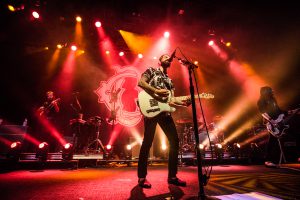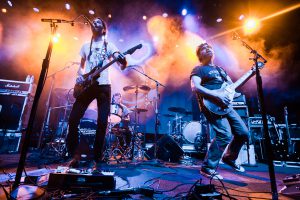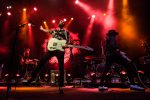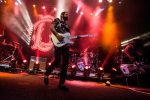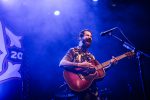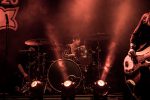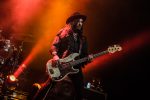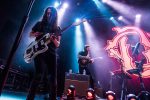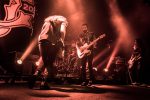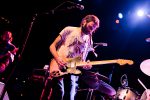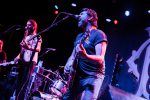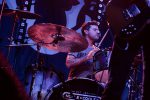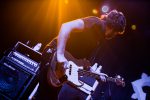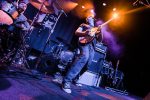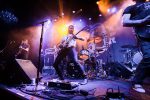REVIEW: Chris Carrabba leads Dashboard Confessional in night of singalongs at The Fillmore
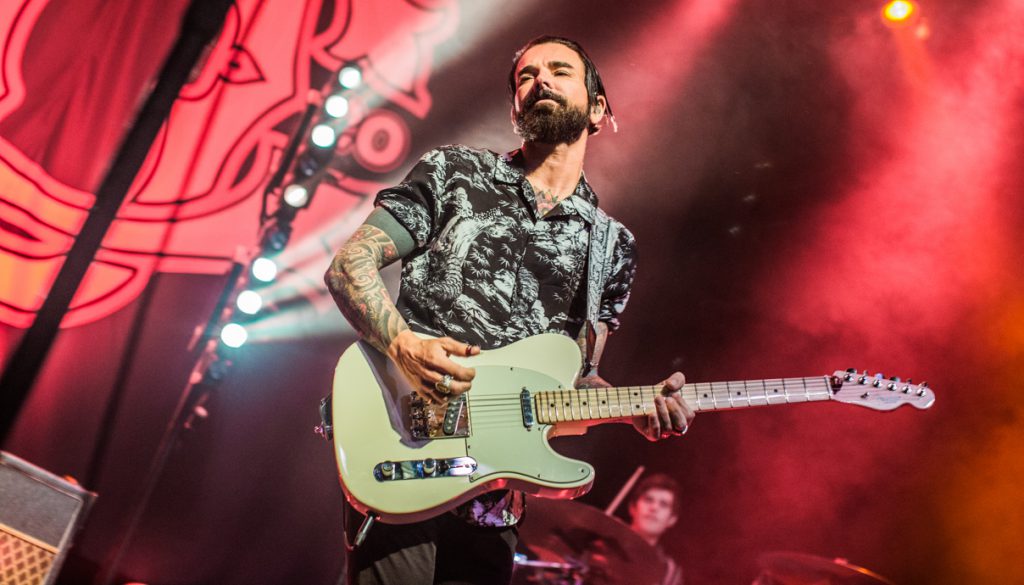
Dashboard Confessional performs at The Fillmore in San Francisco on Feb. 15, 2020. Joaquin Cabello/STAFF.
SAN FRANCISCO — Dashboard Confessional singer-songwriter Chris Carrabba was the first to take the stage at the Fillmore on Saturday, performing “Best Deceptions” alone, with his down-tuned acoustic guitar. It could have been an intimate cafe performance but the packed crowd at the Fillmore wasn’t having it. By the chorus, large swathes of the audience were shouting along.
Dashboard Confessional
Piebald
7 p.m., Sunday
The Fillmore
Tickets: $35.
That’s how the band kicked off its two-night stand in San Francisco. Carrabba luxuriated in a step back while the audience performed the songs of Dashboard Confessional. His resonant lyrics were shouted back to him before he had a chance to sing them. He hung about, grinning beneath the mic, making sure the audience got the timing right.
The assembled crowd was rejuvenated by Carrabba’s adolescent vulnerability. The rest of the band joined him onstage for “Vindicated,” a standard-bearer of ‘90s self-affirmation. Guitarist Armon Jay projected a comfortable slacker future, while touring keyboardist Dane Poppin held back in the cuts.
But, obviously, it was Carrabba’s show. The 44-year-old bearded beach greaser unleashed a canon of clean-cut hits on ready ears. Under Carrabba’s sidelong watch, drummer Chris Kamrada (who joined in 2017) broke loose for some unfiltered end fills. Emo-core mainstay Scott Schoenbeck, longtime Dashboard Confessional bassist and former member of The Promise Ring, dashed his dark locks and communicated with Kamrada to keep songs on pace.
Prior to “The Good Fight,” the business-like Carrabba checked in with the stalwart fans.
“It’s hard to believe 20 years has gone by this way,” he said.
Organizing and orchestrating with his tattooed forearms, Carrabba and his understated man-bun synced with Schoenbeck and Kamradi for a moment of onstage camaraderie. The band stuck around for a run of jangling anthems. A bass-heavy intro presaged “Sharp Hint Of New Tears.” The main part of the song followed, heralded by a jagged chordal pattern played by Carrabba on a cream-colored Fender Telecaster. On “The Brilliant Dance,” Carrabba was accompanied only by the backing vocals of Jay, and the band dissipated again afterward.
During the ensuing solo segment, the modest Carrabba switched guitars frequently. Meanwhile, he managed to keep the songs flowing steadily amid his conversational detours. At one point, he recalled a coastal tryst with a friend.
“I feel like everyone’s been at this point,” he said, reliving a moment of decision and purpose. “We always have the future,” he continued uncertainly, and the band returned to the stage for one of the most synergistic performances of the night.
Nice little rhythmic swells imitated a docked boat’s bobbing in “Carry This Picture.” The band seemed to be on the same page, and its timing was succinct. The song ramped up behind the enhanced guitar stylings of Poppin and Jay. Carrabba then switched to a different, chirpier Telecaster, performing solo the scrappy ballad “This Ruined Puzzle.”
This frequent rearranging of personnel presented some pacing issues. Dashboard Confessional seemed to hem and haw about whether they were a band or a solo act. Nevertheless, Carrabba’s great singalongs had fans engaged at the beginning, middle and end. His emotionally resonant lyrics tapped into a reassuring micro-zone of righteous expression.
Thanks to fans loving his lyrics, Carrabba could afford to take it easy onstage. Ever the professional, he kept one eye on the pace of the performance. He subtly indicated appreciation for fans’ vocal investments of joy and longing. The relaxed and smiling artist was understated but likable, seeming to have achieved a place of contentedness by facing his struggles head-on.
Piebald, also from the early 2000s post-hardcore movement in Boston, opened with an 11-song set that began with the high-strung “The Monkey Versus the Robot” and never let the energy sag with tunes like “King of the Road,” “If Marcus Garvey Dies, Then Marcus Garvey Lives” and “The Stalker.” This was despite the malevolence of a malfeasant pedalboard—which was creating guitar problems for a significant portions of the set.
- Dashboard Confessional performs at The Fillmore in San Francisco on Feb. 15, 2020.
- Dashboard Confessional performs at The Fillmore in San Francisco on Feb. 15, 2020.
- Dashboard Confessional performs at The Fillmore in San Francisco on Feb. 15, 2020.
- Dashboard Confessional performs at The Fillmore in San Francisco on Feb. 15, 2020.
- Dashboard Confessional performs at The Fillmore in San Francisco on Feb. 15, 2020.
- Dashboard Confessional performs at The Fillmore in San Francisco on Feb. 15, 2020.
- Dashboard Confessional performs at The Fillmore in San Francisco on Feb. 15, 2020.
- Dashboard Confessional performs at The Fillmore in San Francisco on Feb. 15, 2020.
- Dashboard Confessional performs at The Fillmore in San Francisco on Feb. 15, 2020.
- Dashboard Confessional performs at The Fillmore in San Francisco on Feb. 15, 2020.
- Dashboard Confessional performs at The Fillmore in San Francisco on Feb. 15, 2020.
- Dashboard Confessional performs at The Fillmore in San Francisco on Feb. 15, 2020.
- Piebald performs at The Fillmore in San Francisco on Feb. 15, 2020.
- Piebald performs at The Fillmore in San Francisco on Feb. 15, 2020.
- Piebald performs at The Fillmore in San Francisco on Feb. 15, 2020.
- Piebald performs at The Fillmore in San Francisco on Feb. 15, 2020.
- Piebald performs at The Fillmore in San Francisco on Feb. 15, 2020.
- Piebald performs at The Fillmore in San Francisco on Feb. 15, 2020.
- Piebald performs at The Fillmore in San Francisco on Feb. 15, 2020.
- Piebald performs at The Fillmore in San Francisco on Feb. 15, 2020.
- Piebald performs at The Fillmore in San Francisco on Feb. 15, 2020.
- Piebald performs at The Fillmore in San Francisco on Feb. 15, 2020.
Follow writer Alexander Baechle at Instagram.com/writheinsmoke. Follow photographer Joaquin Cabello at Instagram.com/joaquinxcabello.

